 Petzlover
Petzlover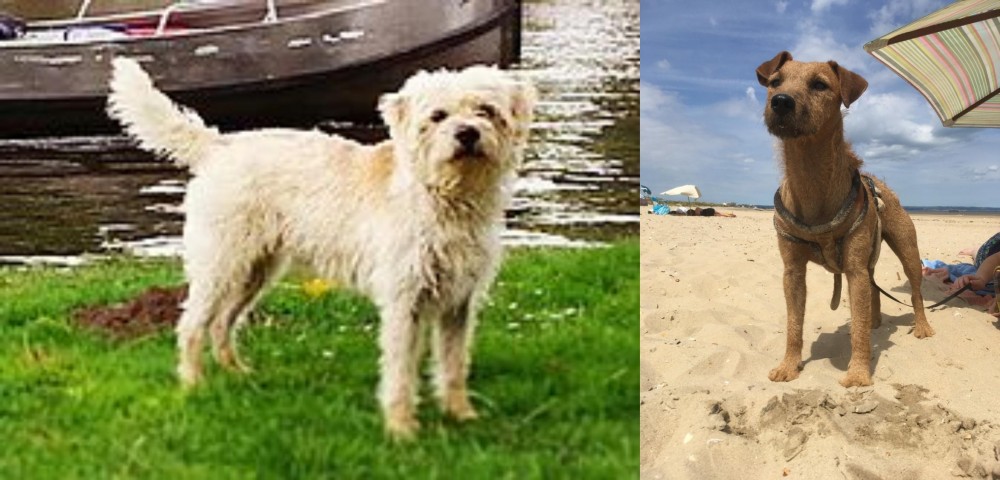 Dutch Smoushond is originated from Netherlands but Fell Terrier is originated from United Kingdom. Both Dutch Smoushond and Fell Terrier are having almost same height. Both Dutch Smoushond and Fell Terrier are having almost same weight. Both Dutch Smoushond and Fell Terrier has almost same life span. Both Dutch Smoushond and Fell Terrier has same litter size. Both Dutch Smoushond and Fell Terrier requires Moderate Maintenance.
Dutch Smoushond is originated from Netherlands but Fell Terrier is originated from United Kingdom. Both Dutch Smoushond and Fell Terrier are having almost same height. Both Dutch Smoushond and Fell Terrier are having almost same weight. Both Dutch Smoushond and Fell Terrier has almost same life span. Both Dutch Smoushond and Fell Terrier has same litter size. Both Dutch Smoushond and Fell Terrier requires Moderate Maintenance.
 The Dutch Smoushond, known also as the Hollandse Smoushond ,Hollandse Herdershond
The Dutch Smoushond, known also as the Hollandse Smoushond ,Hollandse Herdershond
or Dutch Ratter is a small to medium sized dog. The Smoushondenclub was formed in 1905 as it was thought that the breed was dying out and they wanted to register the dog as a purebred breed.
It is believed that the dog’s origins may have to do with the Schnauzer breed. It was in 1973 that a number of breeders looked to reconstruct the breed, using Border Terrier crosses.
Today this rare breed is popular in the Netherlands, but not particularly well known anywhere else. In 2001 it was recognized by the Federation Cynologique Internationale as well as by the United Kennel Club in the United States.
Although the dog was once a skilled ratter, most Dutch Smoushond are kept as companion dogs.
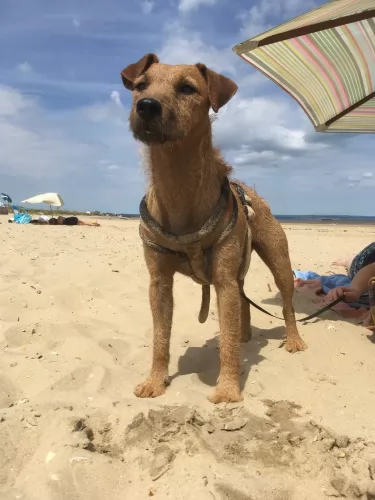 Fell terriers, known by other names such as Lakeland-, Patterdale-, Red Fell or Black Fell Terrier are small working terriers, hailing from the fell or hilly country of northern England.
Fell terriers, known by other names such as Lakeland-, Patterdale-, Red Fell or Black Fell Terrier are small working terriers, hailing from the fell or hilly country of northern England.
Several breeds have been developed from the Fell terrier, of which the Patterdale Terrier, Lakeland are some as well as other locally developed breeds. All these particular breeds are sometimes referred to as the Fell Terrier, and in fact the National Terriers Club LLC has published a Fell Terrier standard.
It is also believed that the long legged Fell Terriers may have descended from an old type of terrier referred to as the rough-coated Black and Tan. The Black and Tan Terrier is now extinct but was drawn into The Kennel Club as the Welsh Terrier.
 The Dutch Smoushond is a small to medium sized dog breed related to the Schnauzer- and Pinscher breed. He stands at about 35 to 43cm at the withers and weighs about 10kg.
The Dutch Smoushond is a small to medium sized dog breed related to the Schnauzer- and Pinscher breed. He stands at about 35 to 43cm at the withers and weighs about 10kg.
He has a rough, shaggy, wiry coat which is waterproof and which is a yellowish or straw color. You’ll notice that the hair around the face is long and fairly straight and forms a beard, eyebrows, and moustache, giving him wise, know-it-all look.
The forelegs are also feathered. He may well give the impression of being ungroomed and untidy with his different length hair. He has floppy ears, the eyes are small and dark, the nose black and the tail is long and feathery, hanging limply when the dog is relaxed.
Easy going, friendly and social, the Dutch Smoushond is a fairly quiet dog, but because he is intelligent and alert, he makes a good watchdog.
When not guarding you, he is cheerful and entertaining. He is an adaptable dog, being able to settle down to life in the city or in the countryside, getting on well with other pets in the home as well as with children.
He is a dog who wants to please, so training him isn’t going to prove difficult. He’ll do well with this training as well as socialization as he becomes obedient, easy-going and relaxed around strangers.
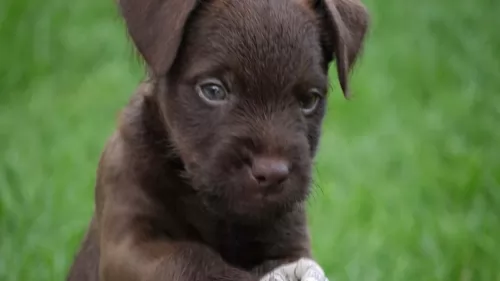 Small and feisty, the Fell Terrier is a working dog used for hunting purposes. He stands at roughly 31cm to 38cm in height and ways between 6 to 9kg.
Small and feisty, the Fell Terrier is a working dog used for hunting purposes. He stands at roughly 31cm to 38cm in height and ways between 6 to 9kg.
The dogs were sought after for their hunting skills as being the small dog they were, and with their narrow chests, they were able to move around in small, narrow underground tunnels.
The Fell has long legs, and his coat is shortish but with a rough texture to it. The coat is found in different colors such as white, black and tan, chocolate, red, black and bronze. The ears are medium length and floppy while the tail of the dog is traditionally docked, but these days the tail is often left long, and then he becomes less distinctive.
Used to having hunted in packs, the Fell Terrier has always been used to getting along well with other dogs. He makes a fantastic family pet and will get on well with children who have been been taught to respect animals. He is an independent, strong-willed dog and will certainly need socialization and training to turn him into an obedient dog.
He is energetic, fearless, strong-willed, determined and always ready for a game or some form of action.
 The Dutch Smoushond, also known as the Dutchie, Dutch Ratter or Dutch Terrier may once have been used as a vermin hunter, but today this terrier dog shares some of the characteristics of the more popular terriers. He may have been a hunter in his day, but more recently he is used as a reliable companion dog.
The Dutch Smoushond, also known as the Dutchie, Dutch Ratter or Dutch Terrier may once have been used as a vermin hunter, but today this terrier dog shares some of the characteristics of the more popular terriers. He may have been a hunter in his day, but more recently he is used as a reliable companion dog.
He tends to be a bit of a barker, particularly when he isn’t getting attention.
He gets on well with other animals in the home as well as with children, but he will need to be trained and socialized. He is lively, friendly and social and is a dog who becomes devoted to his human family.
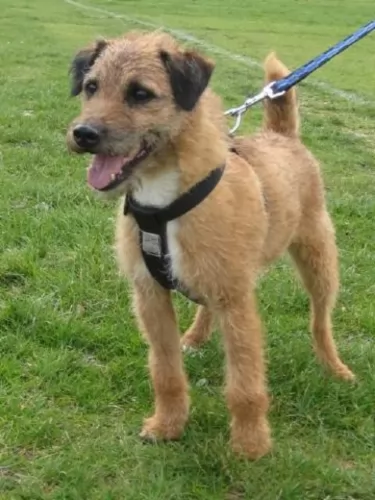 The Fell Terrier still has dreams of the hunt in him and with his strong prey instincts, he isn’t really suited to city living, but will fit ideally into life in the country.
The Fell Terrier still has dreams of the hunt in him and with his strong prey instincts, he isn’t really suited to city living, but will fit ideally into life in the country.
He is a high spirited, working dog with an endless amount of energy. He bonds closely with his human family, and for all his robust, larger-than-life attitude and boldness, when he is with his human family he can be gentle, calm and loving, just thriving on the love he receives.
Your Fell Terrier is just waiting to be your best friend and a never ending source of unconditional love.
 These dogs are a healthy breed, but nonetheless there are are some health problems that can crop up occasionally.
These dogs are a healthy breed, but nonetheless there are are some health problems that can crop up occasionally.
Ear- and eye infections and joint problems are always a major concern, even in young dogs. Bad diet, old age and being overweight can all contribute to your dog developing joint pain. Joint pain symptoms can include -
difficulty with sitting or lying down
limping or even holding a leg up off the ground
lethargic to take part in any activities
Take your pet to the vet who will examine your pet and perhaps request x-rays.
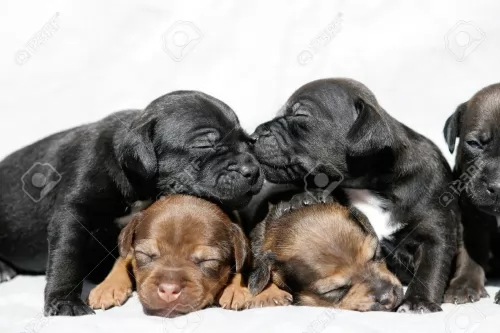 Caring for your Fell Terrier requires knowing what do do with him when he develops certain common dog illnesses. He is a robust dog and is not likely to get any serious illnesses, but still you want to know about some of the more common ones.
Caring for your Fell Terrier requires knowing what do do with him when he develops certain common dog illnesses. He is a robust dog and is not likely to get any serious illnesses, but still you want to know about some of the more common ones.
If you suspect an illness, get your pet to the vet who can provide you with a treatment plan for your dog.
Your Fell Terrier can easily fall prey to dental disease if you don't brush his teeth at least 2 or 3 times a week. Unfortunately bad teeth isn't just a case of losing a tooth or two, bad teeth can cause serious diseases such as kidney disease. Tarter build-up progresses to infection of the gums as well as roots of the teeth. So serious is dental disease that your dog can actually have his life shortened.
Your Fell Terrier is a small dog and obesity can easily creep up if you don't control your pet's diet. Obesity is a serious illness that can increase problems with the joints and digestion.
 The Dutch Smoushond is basically an easy care breed, and it won’t do to try and tame the coat as the dog has a naturally unkempt look.
The Dutch Smoushond is basically an easy care breed, and it won’t do to try and tame the coat as the dog has a naturally unkempt look.
You can brush him twice a week to keep the coat free of matting and to remove loose hairs. The Dutch Smoushond may require the hair being plucked and a professional groomer can do this.
At the same time, the groomer can remove excess hair from the ears and also clean your dog’s teeth. This is of critical importance as bad teeth can lead to a host of health problems.
Get into the habit of brushing your pet’s teeth 2 or 3 times a week, making use of special pet approved toothbrush and toothpaste.
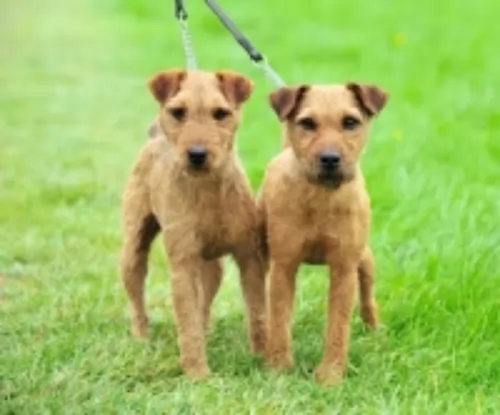 Your Fell Terrier is an active dog who won’t thrive if he is cooped up and ignored. He thrives on action and will need to be taken on walks with you and involved in all your games and sports, such as when you go jogging, swimming or cycling.
Your Fell Terrier is an active dog who won’t thrive if he is cooped up and ignored. He thrives on action and will need to be taken on walks with you and involved in all your games and sports, such as when you go jogging, swimming or cycling.
Feed your Fell Terrier the best quality commercially manufactured foods if you opt to feed your pet this way. Include cooked brown rice, vegetables and chicken into his kibble from time to time and always ensure there is cool, fresh drinking water available to him.
It depends on whether your Fell Terrier has a short, smooth coat, or the longer-haired coarse coat. He will certainly need brushing twice a week and sometimes, with the longer coats, he may require professional trimming or stripping.
Always check nails, in and outside the ears and remember to brush his teeth with canine toothpaste and toothbrush twice a week at least.